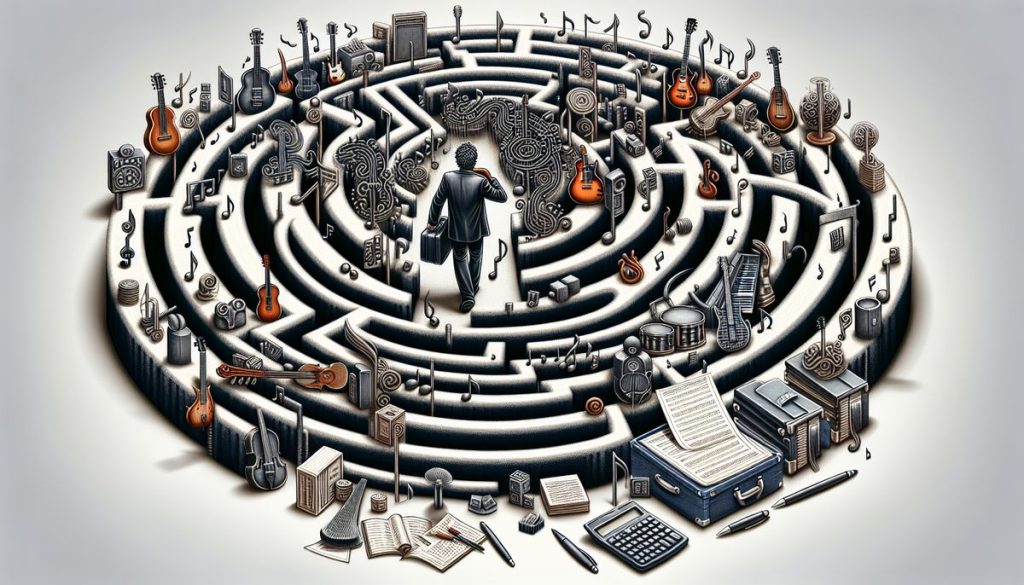5 Essential Financial Literacy Tips for Aspiring Musicians in Today’s Music Industry
Written by DJ Prodigee on Tue Feb, 2024
As an up-and-coming musical artist aiming to succeed in today’s music industry, it is crucial to have a strong foundation in financial literacy. This article provides key financial literacy tips tailored for aspiring musicians, focusing on essential aspects such as business formation, financial management, revenue streams, marketing, and legal knowledge.
Key Takeaways
- Mastering financial literacy is essential for emerging artists in the music industry.
- Balancing artistic integrity with commercial success is crucial for financial stability.
- Understanding different revenue streams and diversifying income sources is key for financial sustainability.
- Effective marketing strategies and branding are essential for building a successful music career.
- Having a good understanding of legal knowledge and copyright law protects your intellectual property and ensures fair compensation.
1. Business Formation for Musicians
Let’s face it, your band’s garage days are over, and it’s time to get serious about the business side of your music. Financial literacy is crucial for up-and-coming musical artists to manage finances effectively, focus on creativity, and navigate the entertainment industry. But don’t fret, we’re not talking about swapping your guitar for a calculator just yet.
Here’s a quick hit-list to keep your finances in tune:
- Seek professional advice early on (don’t wait until the tax man cometh).
- Keep a tight grip on that income and expenses chart (yes, those guitar strings are tax-deductible).
- Understand the legal mumbo-jumbo (copyrights and contracts are your new best friends).
Remember, a well-structured business can be music to your ears when it comes to financial stability. So, take the leap from ‘starving artist’ to ‘savvy entrepreneur’ and make sure your passion for music doesn’t hit a sour note with poor financial planning.
2. Financial Management in Music
Alright, rockstars and pop divas, let’s talk about something that’s as important as your next hit single: financial management. You might be thinking, ‘I’m an artist, not an accountant!’ But hear me out, because keeping your finances in tune is key to making sure your music career doesn’t hit a bum note.
First things first, you’ve got to budget like a boss. Here’s a simple breakdown to keep your cash flow groovy:
- Income: Gigs, streams, merch sales
- Expenses: Studio time, equipment, travel
- Savings: For that rainy day or the next big project
- Investments: Maybe some crypto if you’re feeling adventurous
Remember, a budget is not a dirty word; it’s the backstage pass to your financial freedom. And don’t forget to pay yourself first – your future self will thank you for that extra slice of pizza you can afford down the road.
Now, if you’re swimming in a sea of receipts and bank statements, it might be time to consider some software to help you keep track. There’s a bunch out there that can harmonize your numbers without making you want to smash your guitar.
So, whether you’re just starting out or you’re already on your world tour, take a moment to fine-tune your financial strategy. It’s the difference between being a one-hit wonder and a legend with a portfolio as diverse as your discography.
3. Diversifying Revenue Streams
Let’s face it, putting all your eggs in one basket is a surefire way to make an omelette out of your music career. Diversification is the name of the game, folks! As an aspiring musician, you’ve got to mix it up like a DJ at a Vegas pool party. Here’s the deal:
- Merchandise: Sell those t-shirts, hats, and maybe even bobbleheads with your face on them.
- Live Performances: Rock out at gigs, festivals, and private events.
- Streaming: Get those tunes on Spotify, Apple Music, and the rest of the digital gang.
- Teaching: Share your skills through lessons or online courses.
- Collaborations: Team up with other artists or brands for some sweet, sweet synergy.
Remember, a diverse income portfolio means you’re not crying over spilled milk when one stream dries up. It’s about having a backup plan that keeps the cash flowing, even when the unexpected hits.
So, don’t just sit there strumming the same old chord. Explore every avenue and watch your bank account hit the high notes!
4. Marketing and Branding Essentials
Alright, you musical maestros, let’s talk about making you as famous as your talent deserves. Marketing isn’t just about slapping your name on a poster; it’s an art form in itself. It’s about creating a vibe that screams ‘I’m the next big thing’ without actually screaming, because let’s face it, that’s just rude.
Here’s the deal: your brand is your musical signature. It’s what makes your fans say, ‘Yep, that’s the one!’ So, how do you get that signature to be as iconic as the autographs on a teenager’s cast? Here’s a quick rundown:
- Identify your unique selling point: What makes you different? Is it your funky bass lines or your ability to whistle Mozart? Find it and flaunt it.
- Engage with your audience: Social media isn’t just for cat videos. Use it to connect with your fans and let them peek behind the curtain.
- Merchandise: Who doesn’t want a t-shirt with your face on it? Merch is a great way to make some extra cash and spread your brand.
Remember, your brand is more than just a logo or a catchy name; it’s the entire experience you offer your fans. From the moment they hear your music to the unboxing of your vinyl, make it unforgettable.
And don’t forget, while you’re out there hustling, keep an eye on the essentials. You don’t want to be the artist who’s all style and no substance. So, get your branding right, and you’ll be the name on everyone’s lips – and playlists!
5. Legal Knowledge and Copyright Law
Alright, aspiring Mozarts and Madonnas, let’s talk about the not-so-sexy but oh-so-important world of legal knowledge and copyright law. Knowing your rights is like having a backstage pass to the music biz
First things first, you gotta register your tunes. It’s like calling dibs on your own creativity. Here’s the deal:
- Register your songs to prove they’re yours
- Keep track of all your song versions
- Don’t let anyone play copycat without your say-so
Remember, not registering is like playing a gig without tuning your guitar first – it just doesn’t sound right.
And hey, don’t forget about trademarks. Your band’s name is your brand, and you want to make sure no one else rides your coattails to fame. So, slap a trademark on that bad boy and keep it safe. It’s the music industry’s version of ‘finders keepers’.
Conclusion
So there you have it, aspiring musicians! Remember, in the crazy world of the music industry, financial literacy is your best friend. By following these 5 essential tips, you’ll be on your way to rocking the charts and your bank account. Stay savvy, stay creative, and most importantly, stay financially literate! Keep making music and making money, rockstars! 🎸💰
Frequently Asked Questions
What is the importance of business formation for musicians?
Business formation is crucial for musicians as it establishes a legal entity for their music career, helps separate personal and business finances, and allows for tax benefits and liability protection.
How can aspiring musicians effectively manage their finances in the music industry?
Aspiring musicians can manage their finances effectively by creating a budget, tracking income and expenses, saving for emergencies, and investing in their music career wisely.
Why is diversifying revenue streams important for musicians?
Diversifying revenue streams helps musicians generate income from multiple sources, reduces financial risk, and provides stability in an unpredictable industry.
What are the essential marketing and branding strategies for musicians in today’s music industry?
Essential marketing and branding strategies for musicians include building a strong online presence, engaging with fans on social media, collaborating with other artists, and creating a unique brand identity.
Why is legal knowledge and understanding copyright law essential for musicians?
Legal knowledge and understanding copyright law is crucial for musicians to protect their intellectual property, avoid legal disputes, negotiate fair contracts, and ensure they are compensated for their work.
How can musicians access financing and funding for their music projects?
Musicians can access financing and funding for their music projects through sources like music crowdfunding, funding applications, music export schemes, and financial advice webinars specifically tailored for musicians.





